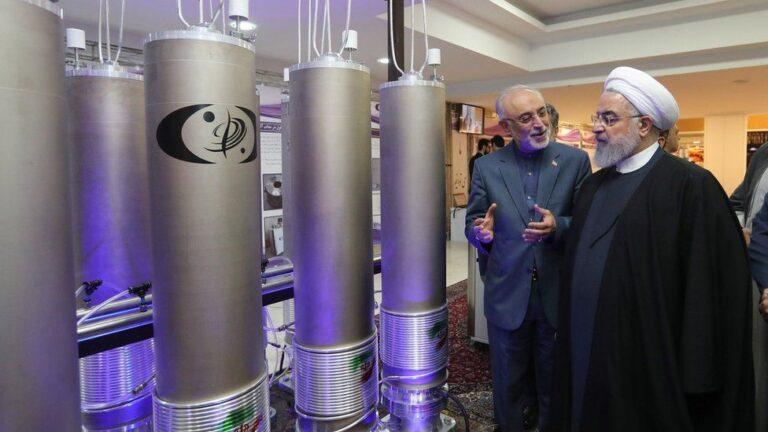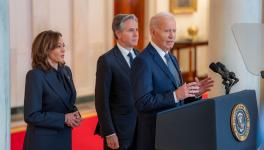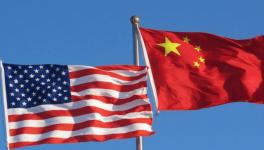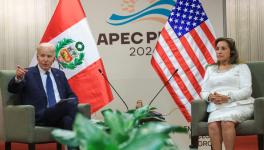Preview Signals Biden’s Foreign Policy Shifts

Iran says it has resumed enriching uranium to 20% purity
In his first media interview, the incoming US National Security Adviser Jake Sullivan has given a preview of Joe Biden administration’s foreign policy directions in regard of Russia, Iran and China. Major shifts can be expected in the policies toward both China and Iran while selective engagement of Russia is on cards.
First, Russia. Sullivan noted that it was “most likely” that Russia is responsible for the massive cyber attacks on the US government system, critical infrastructure and private sector entities that have come to light recently. He didn’t want to “telegraph our punches” but forewarned that Biden will impose “substantial costs” on Russia.
Biden will “choose his time and place” pending a thorough assessment regarding the intent of the attack, how far and wide it had spread and precisely what might result from it. Prima facie, this appears to go beyond“random opportunities for espionage” and downstream destructive action cannot be ruled out. Biden has told aides that from day 1, cyber security will be “a top national security priority of his administration.”
However, Sullivan drew the analogy of the Cold War to point out that even when the US and the former Soviet Union arrayed thousands of nuclear warheads against each other on “a hair trigger”, and spoke in existential terms about their competition with each other, there were areas of cooperation — “more specifically, on arms control and nuclear non-proliferation.”
Therefore, the US and Russia “can act in their national interests” to advance an arms control and strategic stability agenda amidst today’s tense relations. Sullivan disclosed that Biden has “tasked us to pursue from right outside the gate” (after the inaugural ceremony on Jan. 20) the renewal of the new START agreement. He admitted that US will have to look at “extending that treaty in the interests of the United States.”
Sullivan didn’t expand on this selective engagement with Russia to include other issues (eg., Syria, Ukraine, etc.) or on the need of cooperation to meet common challenges. But Sullivan did not use any harsh language against “Russian aggression,” leave alone call Russia a “revisionist power”, etc. Nor did he make any critical references to Russian policies.
Sullivan’s remarks in a measured tone followed come only days after an unusual gesture by Russian President Vladimir Putin last week to convey his Christmas and New Year greetings to Biden where he touched on the “the importance of broad international cooperation” in the backdrop of the coronavirus pandemic and “other challenges which the world faced”.
Putin went on to express the hope that “by building a relationship in the spirit of equality and consideration for each other’s interests, Russia and the United States could contribute much to enhancing stability and security at the regional and global levels.”
CHINA
As regards China, Sullivan’s extended remarks signalled that Biden’s approach will be radically different from that of the Trump administration. He criticised that Trump took on China on its own, while also “picking fights” with its allies and partners. Whereas, Biden intends to “consult with our allies and partners” on how together the US can bring leverage to come to bear on China’s most problematic trade abuses, including dumping, illegal subsidies for state-owned enterprises, forced labour and environmental practices that hurt American workers and farmers and businesses.
Sullivan exuded confidence that said Biden’s extensive contacts with lawmakers in the Congress will help push through his China policies. “He (Biden) knows his mind on China and he is going to carry forward a strategy that is not based on politics, not based on being pushed around by domestic constituencies, but based on the American national interests.”
Sullivan described it as a “clear-eyed strategy, a strategy that recognises that China is a serious strategic competitor to the US that acts in ways that are at odds with our interests in many ways including trade.” At the same time, “it is also a strategy that recognises that we will work with China when it is in our interests to do so”, such as on climate change.
To quote Sullivan, Biden’s strategy will be to work on “our sources of strength here at home so that we can more effectively compete with China on technology, economy and innovation, more effectively invest in our alliances, so as to build up to develop leverages.”
Alongside, the US will be active in international institutions so that it is the US and its partners and not China “who is calling the shots at the key tables on issues ranging from nuclear non-proliferation to international economics.” Sullivan said that Biden’s strategy will be rooted in a clear assessment of the challenges the US faces, of America’s national interests and what are “the points of strength we can bring to bear in this competition.”
What Sullivan didn’t say merits careful attention too. Never once did he mention Trump’s Indo-Pacific strategy or the Quad. He completely avoided any critical remarks about China or references to contentious issues such as Taiwan, Hong Kong, Xinjiang or Tibet.
Sullivan’s characterisation of China as a “serious strategic competitor” differs sharply from the Trump administration’s projection of China as a rival and irreconcilable enemy and aggressor. Indeed, he spoke about the imperatives of engagement with China despite differences.
IRAN
When it comes to Iran, Sullivan did not mince words to underscore that Trump’s maximum pressure policy has been a spectacular failure insofar as Iran is closer to a nuclear weapon today than before and its policies are posing “continuing, ongoing concerns”. Clearly, the promises made by the Trump administration — that US would extract a better nuclear deal, stop Iran’s malign behaviour and so on — did not bear out. The assassination of Qassem Soleimani showed that a strategy that is “so focused on one element of American power and completely sets aside diplomacy” cannot ultimately help attain the US’ strategic objectives.
Sullivan reaffirmed Biden’s stance that if Iran comes back into compliance with the 2015 nuclear deal — that is, reduces its stockpiles, takes down some of its centrifuges — so that it is “back in the box”, then the US will also return to the JCPOA. Significantly, he added, “And that will become the basis of follow-on negotiation.” Sullivan flagged the following:
- Iran’s ballistic missile “has to be on the table” as part of follow-on negotiation.
- There could be conversations that go beyond the P5 + 1 and “involve the regional players” as well.
- In that “broader negotiation”, we can “ultimately secure limits on Iran’s ballistic missile technology” and that is what Biden administration will try to pursue through diplomacy to address both the nuclear file and a broader range of regional issues.”
Sullivan who was instrumental in preparing the ground for the negotiations leading to the JCPOA, noted that the very logic of the 2015 deal was that it’d be narrowly focused on Iran’s nuclear programme, while the US would retain all its capacities — sanctions, intelligence capability, deterrent capacity — to push back at Iran on all other issues.
He said the US had made no assumptions that by going into the nuclear deal, it would change Iran’s behaviour on other issues. But what the US estimated was that if it had the Iranian nuclear programme “in a box, it could then begin to chip away” at some of the other issues. Sullivan regretted that the US did not pursue “clear-eyed diplomacy backed by deterrence”, which was the hallmark of what produced the JCPOA.
Having said that, “it was never fundamentally a part of the nuclear deal that we had expectations.” Therefore, “As we move forward, we will look at each of these issues in its own distinctive way, without presuming that progress on one aspect will necessarily mean progress on other aspects too.”
To be sure, Israel, Saudi Arabia and the UAE will feel disappointed that the “maximum pressure” strategy is going to be unceremoniously dumped, and renewed US-Iranian engagement is on cards. Biden apparently sees no problem in associating Saudi Arabia and the UAE with the forthcoming process of engagement with Iran, but it also has flip side insofar as Iran’s missile capability is its deterrence against the massive arms build-up by these two countries as well as Israeli belligerence.
Therefore, Iran will not agree to unilaterally abandon its deterrent capability. And it is unlikely that Israel would disarm or that the Saudis and Emiratis would agree to curtail their excessive arms purchases. Arguably, the western powers themselves may not be enthusiastic about the highly lucrative West Asian arms bazaar drying up.
Iran has reacted sharply to Sullivan’s remarks saying, “As for Iran’s defence capability, there has never been, there is no and there won’t be any negotiation.” Suffice to say, the US will have to incentivise Iran. A rollback of US sanctions, as provided under the JCPOA, will be a step in that direction.
The bottom line is that Sullivan refrained from demanding any re-negotiation of the JCPOA. Sullivan has phrased it as “follow-on negotiation.” Now, there is going to be a great sense of urgency in kickstarting negotiations. Today, Iran’s enriched uranium stockpiles vastly exceed the limit set by the JCPOA.
Iran also announced today that it has begun the pre-processing stage of gas injection earlier in the underground Fordow nuclear site and the first UF6 enriched uranium will be produced “in a few hours”.
The transcript of Jake Sullivan’s interview with CNN is here.
Get the latest reports & analysis with people's perspective on Protests, movements & deep analytical videos, discussions of the current affairs in your Telegram app. Subscribe to NewsClick's Telegram channel & get Real-Time updates on stories, as they get published on our website.























